On the trail: NH presidential primary to be held Jan. 23
|
Published: 11-15-2023 2:19 PM
Modified: 11-16-2023 4:25 PM |
In the end, no one was surprised.
A nearly year-long battle between New Hampshire history and precedent and the wishes of the Democratic National Committee over the timing of the state’s century-old first-in-the-nation presidential primary came to a culmination on Wednesday.
“The date of the New Hampshire first-in-the-nation presidential primary will be January 23,” Secretary of State Dave Scanlan announced in front of a crowd of national and local reporters, Granite State officials, political leaders and dignitaries crowded into the Hall of Flags at the State House in Concord.
The “date complies with our state statute requiring our presidential primary be at least seven days before any similar event and it preserves the position of the traditional Iowa caucus,” Scanlan said.
As expected, the date formally put the state out of compliance with the DNC’s 2024 presidential nominating calendar.
The state will now face sanctions from the Democrats, which could result in the loss of half of New Hampshire’s delegates to next summer’s national convention. Plus the holding of an unsanctioned primary has led President Joe Biden to keep his name off the New Hampshire ballot. However, Granite State Democrats have launched a write-in campaign in an attempt to prevent an electoral embarrassment for the president as he runs for a second term in the White House.
In making his announcement, Scanlan spotlighted the level playing field New Hampshire gives to White House hopefuls.
“If you had the childhood dream of growing up to be President of the United States, you can try to make that reality in New Hampshire,” he said. “Ballot access is extremely easy, by filling out a one-page declaration of candidacy and payment of a $1,000 filing fee … It is far easier for most candidates to run for president in New Hampshire in the New Hampshire primary than it is for them to run in their own homestate.”
Article continues after...
Yesterday's Most Read Articles
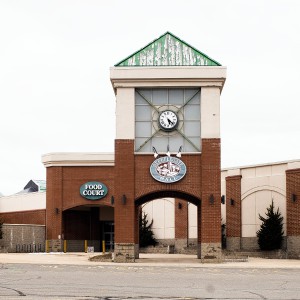 Neighboring landowner objection stalls Steeplegate redevelopment approval
Neighboring landowner objection stalls Steeplegate redevelopment approval
 How has Hopkinton, one of the smallest public schools in New Hampshire, become such a lacrosse powerhouse?
How has Hopkinton, one of the smallest public schools in New Hampshire, become such a lacrosse powerhouse?
 For some older Jewish professors at Dartmouth and UNH, opposition to campus arrests feels personal
For some older Jewish professors at Dartmouth and UNH, opposition to campus arrests feels personal
 Northeast Coffee Festival comes to Concord this weekend
Northeast Coffee Festival comes to Concord this weekend
 Driven by capital projects, city budget proposal would boost spending by $40 million
Driven by capital projects, city budget proposal would boost spending by $40 million
 Henniker Handmade & Homegrown
Henniker Handmade & Homegrown
The Granite State has years of history and tradition in its side.
“The state has a receptive and engaged electorate, a trait that has developed and matured over the last 100 years,” Scanlan said. “For a lesser-known candidate, being able to run in a lead-off primary is critical to their potential success … and New Hampshire voters will give them a shot.”
Republican Gov. Chris Sununu, who spoke minutes after Scanlan, spotlighted the state’s rich history of candidate-to-voter retail-style politics.
“We really are a bottom-up state. We really are that state where you don’t need name ID. You don’t need money. You just need to come out and earn it person-to-person,” the governor said. “And that amazing opportunity that any American can stand up and use New Hampshire really as the doorway for their opportunities and for the rest of the country – that’s something that we take very seriously here and why we hold so true to it. That’s why we have such high voter turnout, why we have such voter participation.”
It was the whims of Democrats that created the conflict, not New Hampshire’s half-century-old law that protects the first-in-the-nation status, Sununu said.
“We haven’t changed a thing in New Hampshire,” Sununu said. “We’re going first because our law says so. Because we’ve earned it. We are the ones who are trying to be amazingly consistent and in all the craziness of this day and age, consistency and integrity in that election process is what everybody is really looking for.”
National Democrats for years have knocked both Iowa – whose caucuses for 50 years led off the party’s nominating calendar – and New Hampshire as unrepresentative of the party as a whole because the states have largely White populations with few major urban areas. Nevada and South Carolina, which in recent cycles have voted third and fourth on the calendar, are much more diverse than either Iowa or New Hampshire. Nevada and South Carolina were added to the Democratic calendar nearly two decades ago to increase the diversity of the early states’ electorate.
While Republicans aren’t making major changes to their schedule, the DNC earlier this year overwhelmingly approved a calendar proposed late last year by Biden to move South Carolina to the lead position on Feb. 3. New Hampshire and Nevada were scheduled to hold primaries three days later, with Iowa entirely losing its early state position. The president and supporters of the new calendar argued that it would empower minority voters, upon whom Democrats have long relied but have at times taken for granted.
To comply with the DNC, New Hampshire would have needed to scrap its state law protecting its first-in-the-nation primary status and expand access to early voting. However, with Republicans in control of the governor’s office and both houses of the state legislature, Democrats repeatedly argued that was a non-starter.
Scanlan challenged the narrative from national Democrats that New Hampshire is not racially diverse enough.
“That is an appealing argument that will certainly impact individuals but it’s not the real reason why this thing is going on,” Scanlan said.
He said Biden’s choice to skip the primary was a “sad choice.”
“New Hampshire doesn’t conform and there are individuals at the national level – probably in both parties – that would like to say ‘this is going to be the nominee. That’s the best person that has a chance of winning the presidency and that’s the person we want on the general election ballot.’ New Hampshire is the polar opposite of that,” he argued “When you have a president that decides that he’s not going to put himself on the ballot before the voters of a state that is going to have a nominating event, I think that’s the wrong decision”
“New Hampshire is for the average person who lives and works on Main Street,” he continued, as he pushed back against what he claimed was “the national elite telling the voters of this country who the nominee’s going to be.”
There are plenty of Democrats in Iowa and New Hampshire who see the upending of their lead-off positions as sour grapes from Biden, who finished a disappointing fourth in the 2020 Iowa caucuses and fifth in the New Hampshire primary – before a second-place finish in Nevada and a landslide victory in South Carolina propelled him toward the nomination and eventually the White House.
The president faces long-shot primary challenges from two Democrats who will be on the ballot in New Hampshire. Three-term Rep. Dean Phillips of Minnesota, one of the wealthiest members of Congress, formally announced his presidential bid as he filed at the State House on Oct. 27 to place his name on the state’s ballot. Also on the Granite State ballot is the other challenger, bestselling author and spiritual advisor Marianne Williamson, who is making her second-straight White House run.
While the president, who turns 81 next week, is the commanding front-runner for the nomination, polls indicate Biden faces mounting concerns from Democrats regarding his age. Those surveys also suggest that many Americans, including plenty of Democrats, don’t want the president to seek a second term in the White House.
There are concerns among Granite Staters that the move by the president and the DNC to revamp the nominating calendar, and his absence from the primary ballot, could lead to a ballot box setback for Biden in New Hampshire.
“There’s no doubt that citizens all across New Hampshire, especially independents and Democrats, are taking notice that they’re being pushed aside by a national party. No one takes very kindly to that – especially in politics, being told that their voice doesn’t matter like it used. I have no doubt it will have a lot of effect come November of ‘24,” Sununu argued.
But longtime New Hampshire based Democrat consultant Jim Demers – a top Biden supporter in the Granite State who’s helping to lead the primary ballot write-in effort on behalf of the president, disagreed with Sununu’s prediction that the battle over the primar y date will impact Democrats next November.
“I think once the nomination is locked up, the convention takes place, Joe Biden will be back in New Hampshire campaigning,” Demers told the Monitor.

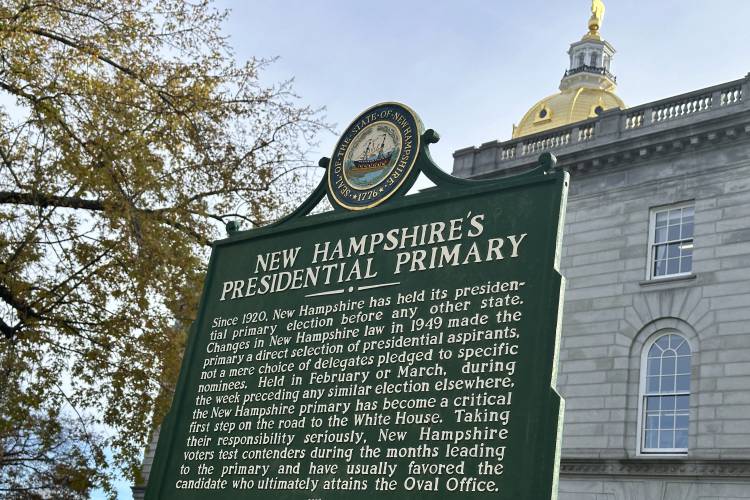
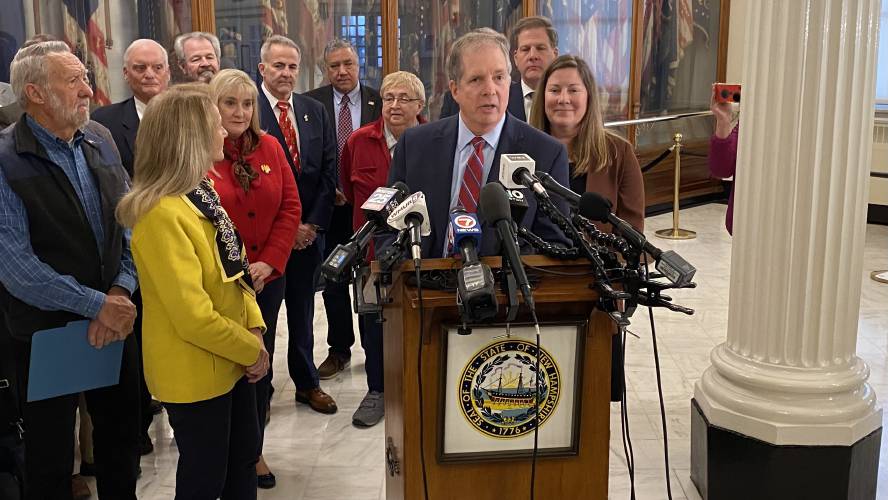
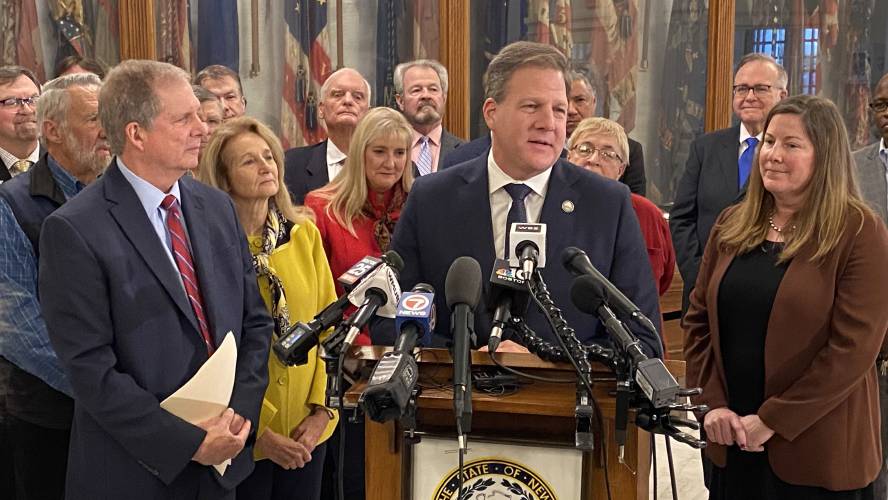

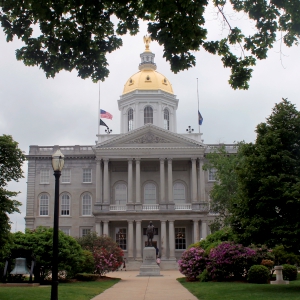 Transgender sports ban receives Senate committee support
Transgender sports ban receives Senate committee support House passes bill to raise minimum marriage age to 18, sending it to governor
House passes bill to raise minimum marriage age to 18, sending it to governor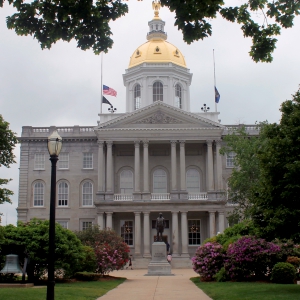 Charities will not have to pay rent to casinos under new law
Charities will not have to pay rent to casinos under new law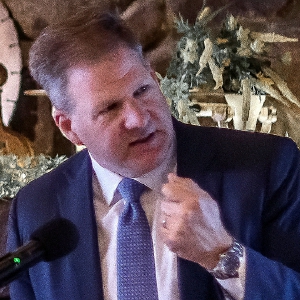 Sununu says he’ll support Trump even if he’s convicted
Sununu says he’ll support Trump even if he’s convicted
